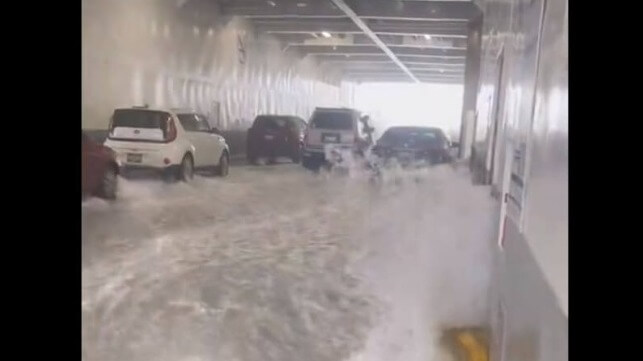Video: Heavy Waves Wash Aboard Car Ferry in Strait of Juan De Fuca

[Brief] Washington State Ferries' roll-on / roll-off car ferries usually operate on sheltered routes, but occasionally they have to make a transit across open water for repositioning. This is a routine matter, so long as the weather is forgiving, but on one recent voyage it was a bit rougher than expected.
On Tuesday, the ferry Issaquah was repositioning to Anacortes from her previously-assigned crossing at Mukilteo. Anacortes is the gateway to the San Juan Islands, and to get there, Issaquah had to cross the east end of the Strait of Juan de Fuca. The Strait is an open runway to the North Pacific, and it is known for periods of foul winter weather.
A harrowing experience, for sure. Glad everyone arrived unscathed and with no damage. The ship’s track shows the crew slowing down and turning into the waves at several points along the west side of Whidbey yesterday morning. Must’ve been wild! #wsf #wawx #pnw ???? ????? pic.twitter.com/4h7SmOMx3B
— Lawson (@bnkwupt) January 10, 2024
On Tuesday morning, Issaquah passed Port Townsend and headed north along the coast of Whidbey Island, making 17 knots. She quickly encountered higher waves than the crew had expected from the forecast, according to WSF. AIS data shows that as she rounded Fort Ebey, she slowed to seven knots and began changing course, zig-zagging northwards along the coast.
There were no passengers on board during this transit, but the crew (and their personal vehicles) were there to witness the effects. One crewmember captured a video of the car deck awash with saltwater, with the rolling sea visible past the open-ended bow. (Advisory: strong language.)
Employee shot this from #Issaquah during rough seas Tuesday near Strait of Juan de Fuca. We were moving vessel w/o passengers to #Anacortes. Damage minimal. This has no effect on service. Ferry will replace #Chelan in #SanJuanIslands by the weekend. Sorry about language in video. pic.twitter.com/62YHJTiTj0
— Washington State Ferries (@wsferries) January 10, 2024
After the ordeal, Issaquah exited the strait and made it to sheltered waters. She arrived safely at her destination at about 1245 hours, about two hours after she entered the strait.

that matters most
Get the latest maritime news delivered to your inbox daily.
According to Washington State Ferries, the damage caused by the encounter was minimal and will have no effect on service.
"We sometimes have waves crashing over the bow, but for this to happen, it is very, very rare. Keep in mind this occurred outside one of our normal routes as we were moving the boat," WSF clarified in a social media post. "This was an extremely rare occurrence for water to get to this level."
